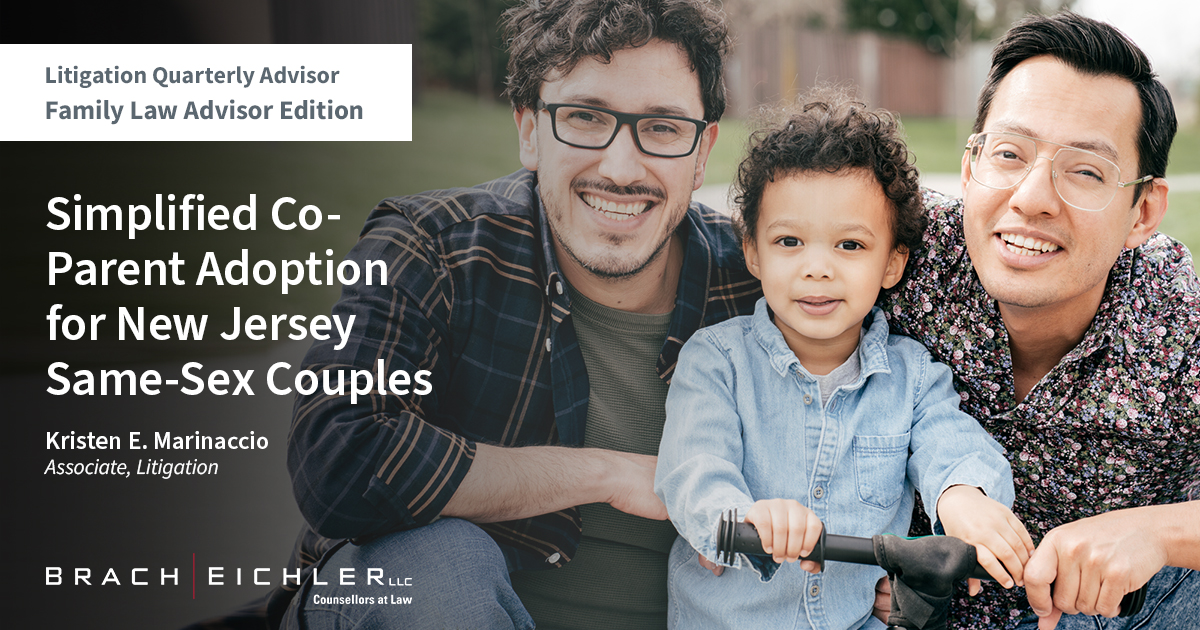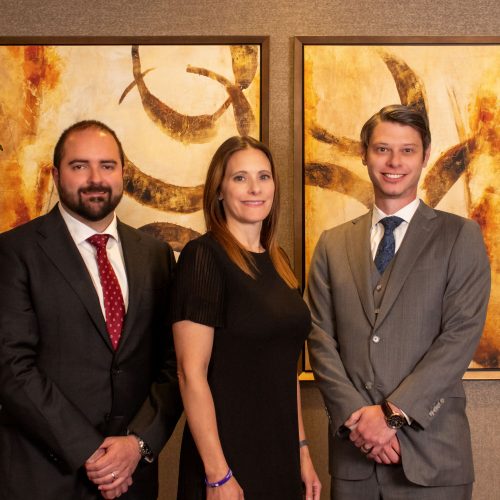Simplified Co-Parent Adoption For New Jersey Same-Sex Couples

Same-sex couples have faced barriers in expanding their families and have long fought to obtain equal adoption rights. The first known adoption case involving a same-sex couple in the United States did not take place until 1970 and the first same-sex female couple adoption, which occurred in California, was not until 1986. Since the first legal adoption, there is no debate that biomedical reproductive technology has progressed rapidly, aiding many same-sex couples in starting a family. In recognition of those advancements and the outdated legal limits placed on same-sex couples’ ability to start a family, the New Jersey legislature enacted the Legal Parentage Act (N.J.S.A. 9:17-69 to -71) in April of 2020. The Legal Parentage Act amended the law governing the adoption of children to permit civil union partners or legal parents of a child, when those persons are named as parents on the child’s birth certificate, to obtain a judgment of adoption in lieu of pursuing a confirmatory co-parent adoption.
For married heterosexual couples, there is a presumption of paternity for the husband under N.J.S.A. 9:17-43. However, that same presumption does not exist for same-sex couples. If a child is born to one parent of a same-sex relationship, the same-sex parents may, in New Jersey, put both parents names on the child’s birth certificate, however, that does not obviate the need for adoption to confer legal parentage.
Prior to the enactment of the Legal Parentage Act, same-sex couples had to undergo a lengthy and expensive process to adopt, even if both parents were listed on the child’s birth certificate. The adoption process required background checks including: (l) Criminal History Record Information (“CHRI”) fingerprint background checks; (2) Division of Child Protection and Permanency system name checks, now referred to as Child Abuse Records Information (“CARI”) and (3) Domestic Violence Registry checks. As a result of the enactment of the Legal Parentage Act, courts are required to waive those background checks.
The Legal Parentage Act has streamlined the adoption process for New Jersey same-sex couples and facilitates a less cumbersome procedure for establishing the legal parentage of non-biological parents. Under the Legal Parentage Act, specifically N.J.S.A. 9:17-71(b), to qualify for a co-parent adoption, petitioners must attach the following to the adoption complaint: (l) proof of a valid civil union or marriage between the natural or legal parent and that person’s partner in civil union or spouse, issued prior to the birth of the child; (2) an original birth certificate issued by the State Registrar of Vital Statistics on which both partners in civil union or spouses are listed as parents of the child; and (3) a written declaration signed by both parties to the action that describes in sufficient detail how the child was conceived and identifies any other involved parties so that the court may determine whether those individuals have parental rights to the child.
Once the court finds that the petitioners have satisfied these three requirements, the Family Part will issue a Judgment of Adoption naming both petitioners as the legal parents of the adopted child, without need for a court appearance by the parties. An in-court appearance is only required if the Court determines that another individual may have existing parental rights to the child, then the Court must order and conduct a hearing on the matter, providing notice to all parties, before issuing a Judgment of Adoption. However, no notice is required to any person who may be a donor. Furthermore, the Legal Parentage Act, specifically N.J.S.A. 9:17-44(b), provides that unless the donor and the natural mother enter into a contract establishing the donor as a parent of the child, the donor is not treated as a father and shall have no rights or duties stemming from the conception of the child. Notably, the Legal Parentage Act is not applicable for same-sex couples who have used known sperm donors and not legally terminated the donor’s rights in the state of conception. This law also does not apply to same-sex couples without legal recognition of their partnership.
Same-sex couples have faced a long and winding road to family equality. While New Jersey has a history of promoting acceptance and expansion of same-sex couples’ rights, not every state has similar legislative policies. In many states, simply having both same-sex parents on a child’s birth certification, even if the parties are married or in a civil union, is not enough to ensure the non-biological parent’s legal parentage. For those same sex-couples that the Legal Parentage Act applies to, establishing legal parentage for the non-biological parent through this simplified process, which has curtailed the lengthy and costly process, removed background checks, and eliminated court appearance(s), is advisable to ensure his or her parental rights are recognized, especially if the family decides to move or travel outside of the state of New Jersey.
For more information, contact:
Kristen E. Marinaccio | 973.403.3138 | kmarinaccio@bracheichler.com












